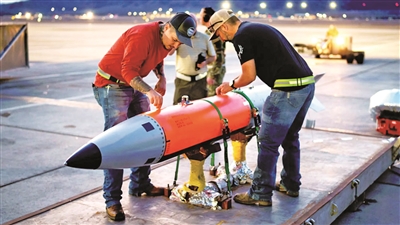
This is a picture of the B61 nuclear bomb released by Sandia National Laboratories in the US.
美国桑迪亚国家实验室发布的B61核弹照片。
By Wang Daning
王大宁
Recently, many European countries have been vocal on the issue of "nuclear armament" with the rapid changes in the situation of the Russia-Ukraine conflict and the relationship among the US, Europe, and Russia. The security anxiety and nuclear possession rhetoric of European countries have quickly spread to the Asia-Pacific allies of the US, triggering widespread concerns about nuclear proliferation.
近期,随着俄乌冲突局势和美欧俄关系的急剧变化,欧洲多国在“核武装”问题上密集发声。欧洲国家的安全焦虑和“拥核”言论迅速传导到美国的亚太盟友,引发各界对“核扩散”的忧虑。
On March 7, Polish Prime Minister Donald Tusk said that Poland should be seeking to gain access to the most advanced capabilities, including those linked with nuclear arms and state-of-the-art non-conventional weapons. On March 12, Polish President Andrzej Duda called on the US to deploy nuclear weapons in Poland in response to possible actions by Russia.
3月7日,波兰总理图斯克称,波兰必须追求最先进的能力,包括核武器和现代化的非常规武器。12日,波兰总统杜达呼吁美国在波兰部署核武器,以应对俄罗斯可能采取的行动。
The "nuclear armament" has also been frequently mentioned in the Asia-Pacific region, particularly in Japan and the ROK. The ROK has publicly stated that it may deploy tactical nuclear weapons or develop its nuclear arsenal. Similarly, Japan has suggested discussing arrangements like NATO's nuclear sharing arrangements. Japan also deleted references to its previous Three Non-Nuclear Principles from its national report submitted to the Nuclear Non-Proliferation Treaty (NPT) Review Conference. Additionally, Australia is seeking to revive its nuclear weapons program from the 1970s.
“核武装”论在亚太地区的日本和韩国也多次被提及。韩国曾在公开场合表示,可能“部署战术核武器或拥有自己的核武器”。日本也曾表示,应讨论类似北约“核共享”的安排。日本还在向《不扩散核武器条约》审议大会提交的国家报告中删除以往报告中提到的“无核三原则”内容。澳大利亚也谋求重启20世纪70年代的核武计划。
A report released by the Stockholm International Peace Research Institute (SIPRI) in 2022 predicted that the global nuclear arsenal would rebound within the next decade. The trend of continuous reduction in the number of nuclear warheads since the 1980s would change, and the global nuclear disarmament process might usher in an important turning point. Many experts believe that Japan and the ROK in Asia, as well as Germany, Italy, the Netherlands, Poland, Sweden, and Norway in Europe, are "nuclear threshold states" as they are technically capable of developing nuclear weapons if provided with sufficient time and resources. Once the above-mentioned "nuclear threshold states" cross the threshold, the regional security situation will change dramatically.
瑞典斯德哥尔摩国际和平研究所于2022年发布报告称,全球核武库在未来10年会触底反弹,20世纪80年代以来核弹头数量持续削减的趋势将发生改变,全球核裁军进程或迎来重要转折点。不少专家认为,亚洲的日本和韩国,以及欧洲的德国、意大利、荷兰、波兰、瑞典、挪威等国,在技术上都是“核门槛国家”,只要具备充足时间“窗口”和资源投入,都能成功研发核武器。需要指出的是,上述“核门槛国家”一旦“破门而入”,将导致地区安全局势剧变。
It is generally believed that the primary reason for the sudden rise in the risk of nuclear proliferation is the strategic shift of the Trump administration and the negative effects of the "nuclear sharing" mechanism led by the US. The essence of the "nuclear sharing" model is an "extended nuclear deterrence" arrangement between the US and NATO allies, where the US conditionally transfers partial control of its nuclear weapons to non-nuclear NATO member states. This arrangement fundamentally undermines the international nuclear non-proliferation system.
评论普遍认为,当前核扩散风险骤然高企的首要原因,是美国特朗普政府的战略转变及美国主导的“核共享”机制的负面效应。“核共享”模式的实质,是美国与北约盟国达成的一种“延伸核威慑”制度安排,即美国有条件地将部分核武器控制权交给北约无核成员国,这本身就破坏了国际核不扩散体系。
Recently, the Trump administration has drastically shifted its stance on the Russia-Ukraine conflict and deliberately downplayed its security commitments to allies, triggering a crisis of trust within NATO. As a result, the security anxiety of European countries has quickly spread to the Asia-Pacific allies of the US, leading to frequent discussions about "nuclear armament."
近期,美国特朗普政府对俄乌冲突态度骤变,并刻意淡化对盟友的安全责任,引发北约内部信任危机。欧洲国家的安全焦虑也迅速传导到美国的亚太盟友,“核武装”因而被频繁提及。
Analysts point out that as the US shifts toward "new isolationism," some countries may leverage US power to deploy nuclear weapons on their territory and gradually develop independent nuclear capabilities. Once a country crosses the line, it could trigger a "broken windows effect" and a chain reaction. Other countries, especially neighboring ones, will follow suit and the risk of preventive strikes and even nuclear confrontation will escalate.
分析人士指出,随着美国转向“新孤立主义”,一些国家可能借助美国力量,把核武器部署在境内,趁势逐渐发展独立的核力量。一旦某国开始突破“核禁区”,可能引发“破窗效应”和连锁反应。其他国家特别是周边国家相继效仿,将导致预防性打击乃至核对抗风险升级。













